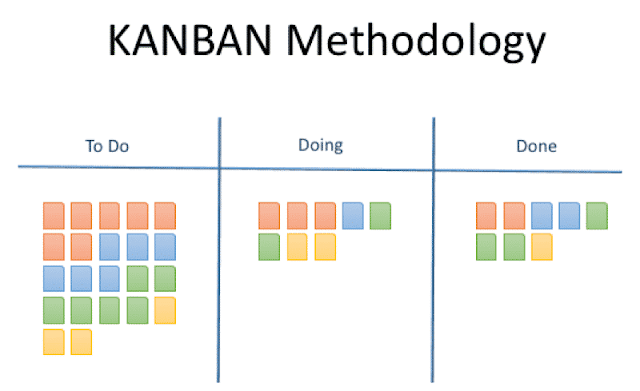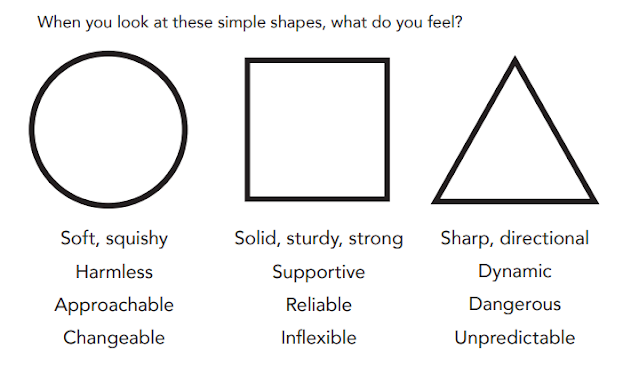Our lecture this week was on agile practice and project management, with specific focus on time management and planning. In game development, agile practice is a repetitive process, involving working on small projects instead of one larger project as a whole. These "small projects" will involve an agile cycle, in order to complete a specific part of the game's development, on the way to completing the final project. Types of agile cycle include Scrum, Sprint, and Kanban.
 |
| Fig. 1: Unknown maker. No title. - Example of agile practice. |
A sprint consists of a series of stages. A simplified version would be: plan, develop, launch, review. This process can be repeated multiple times on the way to completing the final product, with each sprint focusing on a specific aspect. This allows any issues to be fixed following the review stage, unlike within the Waterfall method, which is more linear and can lead to problems being ignored until the final stage, as the product isn't continually reviewed and tested.
During this week we also had a team meeting, via Discord, to discuss our plan for the Game Jam and build a better understanding of our roles in the group. For myself, and some other members, there had been confusion about what task each of us should be completing and when, in order to create our game. By the end of the meeting, a team member had set up a Trello board for us to keep track of our work, and what other team members had been doing.
This interaction with my team raised some thoughts about the last few years, and how the Covid-19 pandemic pushed many companies to move towards remote and/or hybrid work, as workers began to favour working from home; "In February 2022, the most common hybrid working pattern that workers planned to use was working mostly from home, and sometimes from their usual place of work... The proportion who planned to return to their place of work permanently fell from 11% in April 2021 to 8% in February 2022." (Is hybrid working here to stay? - Office for National Statistics, 2022).
The pandemic has fundamentally changed how people think and feel about work, with employees valuing their free time and mental health more; "our priority structures were ruthlessly simplified. Some days, our only focus was to stay alive and keep our loved ones safe... According to a recent study by Ernst & Young (EY), 54% of workers left a previous job because their boss wasn’t empathetic to their struggles at work, and 49% said employers were unsympathetic to their personal lives." (Moss, 2022).
The Games industry was, like all businesses, affected by the pandemic; "from tiny indies to multi-studio powerhouses, from the US to Japan and everywhere in between, developers have had to very suddenly trade office floors for bedrooms." (Clayton, 2022). This lead to delays in development and release, as studios shifted to at-home work; ""We moved all our people to [home offices], supported them with software, hardware, furniture and amenities. A very limited number of people stayed in the office to make sure everything ran smoothly (servers, etc.)"." (Clayton, 2022). Game developer Bungie recently announced "most current and future roles will be available remotely or on a hybrid basis" (Clayton, 2022), proving a definite shift in the industry, and something I'll be considering on my career path, as the idea of moving to a much larger and busier area has become increasingly negative over the last few years; "games don't require some secret magic obtained through having 500 people in the same building, that developers shouldn't need to relocate to expensive hub cities to make the games we love." (Clayton, 2022).
Despite the benefits of working from home -- lack of commute, schedule flexibility, better work-life balance, etc. (Hart, 2020) -- there are also many disadvantages, some of which became prevalent during our first week of the Game Jam. Lack of social interaction, routine, and discipline were the most obvious. After one meeting, it was clear our team needed to set up regular meetings to discuss our work, both via Discord and in-person. Whilst the online meetings were easier to do more frequently, there were clear benefits to in-person social interactions; "face-to-face conversation is an important aspect of a teams’ communication context and is essential in regulating teams’ cohesion and attitude. Overall, in-person communication reduces negative affect in teams working together" (BCD Meetings and Events, 2022).
Planning more frequent meetings and discussions will hopefully benefit our team, and maintain a stronger feeling of this being a group, collaborative project, instead of an individual one.
Something else discussed in our lecture that will be helpful in our team work is Version Control. Version Control allows the whole team to view and access all project files and code, and helps prevent the loss of information during production. The Games Academy at Falmouth University primarily uses Git, a software that not only provides file access to multiple team members, but also keeps track of changes made. This means, for example, if a piece of code causes problems in a file, but the issues aren't noticed until some time later, Git will keep track of when the code was editted, allowing programmers to return to the older version and fix the problem where it began. It is an invaluable resource for collaborative work, especially for a team that primarily works apart from each other.
This week also involved an introduction to ZBrush, a program that, unlike Maya, I have no experience in using. Initially I enjoy the idea of being able to sculpt a model in a more traditional way; being able to turn and shape it as I go. However, trying to work out the best brush, adjusting pressure, and using a tablet to sculpt, felt very foreign and uncomfortable for most of the workshop. I aim to watch some beginner content on using ZBrush, including one posted by our lecturer. With these, I hope I can get to grips with ZBrush, and spend some time at university practicing it with the asset I began building in Maya.
Finally, at the end of this week I was able to attend a life drawing class. It was nice getting back into doing traditional art, and being asked to use charcoal as a medium put me out of my comfort zone, but pushed me to work in a way I wouldn't normally.
 |
| Fig. 3: Spence, 2022. Life Drawing 15 Minute Studies |
References:
KEITH, Clinton. 2010. 'The State of Agile in the Game Industry' [Online] Game Developer. Available at: https://www.gamedeveloper.com/business/the-state-of-agile-in-the-game-industry [Accessed on 13/10/2022]
Ons.gov.uk. 2022. 'Is hybrid working here to stay?' Office for National Statistics. [online] Available at: https://www.ons.gov.uk/employmentandlabourmarket/peopleinwork/employmentandemployeetypes/articles/ishybridworkingheretostay/2022-05-23 [Accessed on 10/10/2022]
MOSS, Jennifer. 2022. 'The Pandemic Changed Us. Now Companies Have to Change Too..' [online] Harvard Business Review. Available at: https://hbr.org/2022/07/the-pandemic-changed-us-now-companies-have-to-change-too [Accessed on 11/10/2022]
CLAYTON, Natalie. 2022. 'Covid-19 taught the games industry to be better' [Online] PC Gamer. Available at: https://www.pcgamer.com/covid-19-taught-the-games-industry-to-be-better/ [Accessed on 11/10/2022]
CLAYTON, Natalie. 2022. 'Bungie will offer fully-remote options for 'most current and future roles'' [Online] PC Gamer. Available at: https://www.pcgamer.com/bungie-will-offer-fully-remote-options-for-most-current-and-future-roles/ [Accessed on 11/10/2022]
HART, Meredith. 2020. 'The Pros and Cons of Working From Home: Navigating Remote Work' [Online] Owl Labs. Available at: https://resources.owllabs.com/blog/work-from-home-pros-cons [Accessed on 11/10/2022]
BCD Meetings and Events. 2022. 'The Business Case for Returning to Meeting Face-to-Face'. [online] Insights.bcdme.com. Available at: https://insights.bcdme.com/blog/the-return-of-live-events-customer-insights [Accessed on 11/10/2022]
Images:
Figure 1. Unknown maker. No title. K&C [online]. Available at: https://kruschecompany.com/agile-software-development/ [Accessed on 11/10/2022]
Figure 2. Unknown maker. Kanban Methodology. Starloop [online]. Available at: https://starloopstudios.com/best-agile-practices-in-game-development/#:~:text=Agile%20game%20development%20is%20an,efficient%20games%20for%20their%20customers. [Accessed on 11/10/2022]
Figure 3. SPENCE Nel. 2022. Life Drawing 15 Minute Studies. Private Collection: Nel Spence





No comments:
Post a Comment